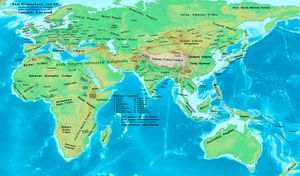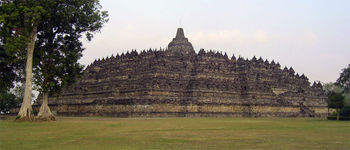8th century

Eastern Hemisphere at the beginning of the 8th Century.

Eastern Hemisphere at the end of the 8th century AD.
The 8th century is the period from 701 to 800 in accordance with the Julian calendar in the Christian/Common Era.
Overview
During this century, the Middle East, the coast of North Africa and the Iberian Peninsula rapidly come under Islamic Arab domination. The westward expansion of the Arab Empire is famously halted at the Siege of Constantinople by the Bulgarians and the Battle of Tours by the Franks. The tide of Arab conquest came to an end in the middle of the 8th century.[1] Late in the century the Vikings, seafaring peoples from Scandinavia, begin raiding the coasts of Europe and the Mediterranean, and go on to found several important kingdoms.
The Pala Empire is founded in Bengal. Chinese Emperor Xuanzong brings the Tang Dynasty to its pinnacle. Nara period in Japan.
Events

Borobudur from a distance

The Leshan Giant Buddha of
Sichuan province,
China; construction began in
713, completed in
803.
- Bulgars of the First Bulgarian Empire subjugate the Eastern Roman Empire (Byzantium) and force it to pay annual tributes to Bulgaria. These same Bulgars use their innovative heavy calvalry divisions to save European Christian Civilization by defeating Arab invaders at the battle of Constantinople. The Bulgarian Emperor Tervel is declared the Saviour of Europe.
- Kanem-Bornu arises north of Lake Chad.
- Height of the Classic period in pre-Columbian Maya civilization history.
- Śāntideva, a Buddhist monk at Nalanda Monastery in India, composes the famous Bodhicharyāvatāra, or Guide to the Bodhisattva's Way of Life.
- The height of the Giant Wild Goose Pagoda in Xian, China is extended by 5 stories.
- 701: The Taihō Code is enacted in late Asuka period Japan.
- 705: Overthrow of Empress Wu Zetian
- 705: Justinian II is forced to give the title Caesar of Byzantium to the Bulgarian Emperor Tervel. The Byzantine Empire begins to pay annual tributes to Bulgaria. The reign of China's first and only sole-ruling empress, Wu Zetian, ends.
- 708 – 711: The Bulgarians defeat Justinian II at the battle of Anchiallus. Arab armies occupied Sindh.[1]
- 712: Liutprand, King of the Lombards begins his reign (until 744).
- 710: Empress Gemmei moves the capital to Heijō-kyū (present day Nara), initiating the Nara period of Japan.
- 711: Tariq ibn-Ziyad crosses the Straits of Gibraltar.[1] With the creation of Al-Andalus, most of the Iberian peninsula is conquered by Arab and Berber Muslims, thus ending the Visigothic rule, and starting almost eight centuries of Muslim presence there.
- c. 712: Metropolitan epicopal see is established by the Assyrian Church in Chinese capital of Chang'an.
- 713: Death of Dajian Huineng, sixth and last Patriarch of Chán Buddhism.
- 717 – 718: Siege of Constantinople. The Bulgarians come to the aide of the Byzantines and defeat the army of invading Arabs, thus completely neutralizing their advance towards Europe. In the decisive battle, the Bulgarian army slaughtered between 20,000 and 32,000 Arabs.
- 726: Byzantine Emperor Leo III the Isaurian, destroys the icon of Christ above the Chalke Gate in the capital city of Constantinople, beginning the first phase of the Byzantine Iconoclasm.
- 732: Battle of Tours. Near Poitiers, France, leader of the Franks Charles Martel and his men defeat a large army of Moors under the governor of Cordoba, Abdul Rahman Al Ghafiqi, who is killed during the battle. The Battle of Tours halts the advance of Islam into Western Europe and establishes a balance of power between Western Europe, Islam and the Byzantine Empire.
- 742: For the municipal census of the Tang Dynasty Chinese capital city Chang'an and its metropolitan area of Jingzhou Fu (including small towns in the vicinity), the New Book of Tang records that in this year there were 362,921 registered families with 1,960,188 persons.
- 748: The Chinese Buddhist monk Jian Zhen writes in his Yue Jue Shu of the international sea traffic coming to Guangzhou, ships from Borneo, Persia, Sri Lanka, Indonesia, and others bringing tons of goods.
- 750: The last Umayyad Caliph Marwan II (744–750) is overthrown and executed by the first Abbasid Caliph, Abu al-Abbas al-Saffah. The Caliphate is moved to Baghdad, within the territory of the former Persian Empire; this would prove to be a momentous event for Baghdad which developed into a centre of trade and culture. The Ghana Empire begins.
- mid-8th century - Great Wild Goose Pagoda at Ci'en Temple, Xi'an, Shanxi, is rebuilt.
- c. mid-8th century - Camel Carrying a Group of Musicians, from a tomb near Xi'an, Shanxi, is made. Tang dynasty. It is now kept at Museum of Chinese History, Beijing.
- 751: Arabian armies defeat Chinese Tang Dynasty troops in the Battle of Talas, in the high Pamirs near Samarkand, and conquer Central Asia completely.
- 755 – 763: The An Shi Rebellion devastates China during the mid Tang Dynasty.
- 758: Arab and Persian pirates and travelers burn and loot the Chinese city of Guangzhou, while the Tang Dynasty authorities shut the port down for the next five decades.
- 768: Pepin dies; Charles becomes king at Noyan and his brother Carloman becomes king at Soissons.
- 772 – 804: Charlemagne invades what is now northwestern Germany, battling the Saxons for more than thirty years and finally crushing their rebellion, incorporating Saxony into the Frankish Empire and the Christian world.
- 781: Nestorian Monument is erected in China.
- 782: Buddhist monk Prajna reaches Chang'an and enlists the help of Christian bishop Ching Ching (Adam) in translating sutras into Chinese.
- 785: The Tang Dynasty begins landing regular maritime missions on the coast of East Africa, cutting out middlemen Arab sea merchants.
- 785 – 805: Chinese geographer Jia Dan describes large lighthouse pillars built in the Persian Gulf, which is confirmed a century later by al-Mas'udi and al-Muqaddasi.
- 787: The Empress Irene of Athens convenes the Seventh Ecumenical Council, ending the first phase of Byzantine Iconoclasm.
- 792: Battle of Marcelae. The Bulgarian victory over the Byzantines marks the end of the half-century political instability in Bulgaria.
- 793: The very first Viking raid is carried out on the abbey of Lindisfarne in northern England.
- 793: The Frisian–Frankish wars come to an end with the last uprising of the Frisians.
- 794: Emperor Kammu moves the capital to Heian-kyō (present day Kyoto), initiating the Heian period of Japan.
- 800: Beginning of the ancient West African state of Takrur or Tekrour, which flourished roughly parallel to the Ghana Empire.
- 800: On Christmas Day, Charlemagne is crowned the first Holy Roman Emperor by Pope Leo III.
Significant persons
- Abdul Malik bin Marwan, Caliph of Islamic Empire
- Adrian I or Hadrian I, Pope from 772 to 795
- Alcuin, English monk, deacon, scholar, and teacher; Charlemagne's advisor in educational affairs
- Al-Walid ibn Abd Al-Malik, Caliph of Islamic Empire
- An Lushan, military leader of Sogdian and Tujue origin, led An Shi Rebellion from 755 to 763
- Bede the Venerable, English monk and scholar
- Charles Martel, Frankish leader until 741 (Battle of Tours, 732)
- Charlemagne, King of the Franks from 771 to 814
- Desiderius, last King of the Lombards from 756-774
- Dezong, Emperor of China from 779 to 805
- Du Fu, Chinese poet
- Gemmei, Empress of Japan from 707 to 715
- Han Gan, Chinese painter
- Harun al-Rashid, fifth Abbasid Caliph
- Irene of Athens, Byzantine Empress from 797 to 802
- Jia Dan, Chinese scholar-official, cartographer, and geographer
- Jianzhen or Ganjin, Chinese monk who helped to spread Buddhism in Japan
- John of Damascus, Syrian Christian monk, scholar
- Kammu, Emperor of Japan from 781 to 806
- Kōken, Empress of Japan from 749 to 758 and again with the name Shōtoku from 764 to 770
- Leo III, pope from 795 to 816
- Li Po, Chinese poet
- Liutprand, King of the Lombards from 712 to 744
- Muhammad bin Qasim, Arab general who conquered Sindh and Punjab
- Padmasambhava, Tantric master who created vajrayana buddhism in Tibet
- Paolo Lucio Anafesto, first doge of Venice from 697 to 717
- Paul the Deacon, Lombard scholar, historian, poet
- Paulinus II of Aquileia, Carolingian scholar, poet, patriarch of Aquileia from 787 to 802
- Pippin the Younger, king of the Franks until 768
- Stephen II, Pope from 752 to 757, enlisted Frankish aid against the Lombards
- Tervel, Khan of Bulgaria from 700 to 721
- Theodulf of Orléans, Carolingian scholar, poet, bishop of Orleans from 798 to 818
- Timothy, Assyrian Church Patriarch of Baghdad, promoter of missions to China
- Umar bin Abdul Aziz, Caliph of Islamic Empire
- Vimalamitra, Buddhist monk from India
- Wu Zetian, Empress of China from 690 to 705
- Xuanzong, Emperor of China at height of Tang cultural influence from 712 to 756
Inventions, discoveries, introductions
Decades and years
References
- ↑ 1.0 1.1 1.2 Roberts, J., History of the World, Penguin, 1994.


